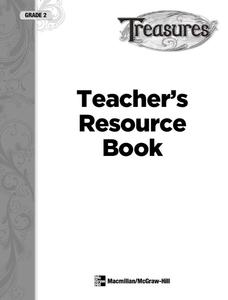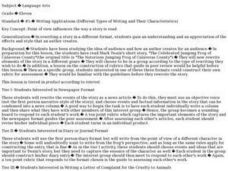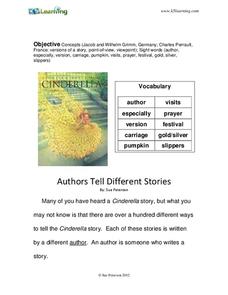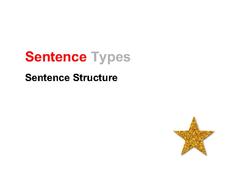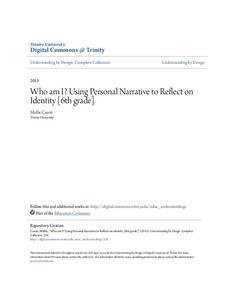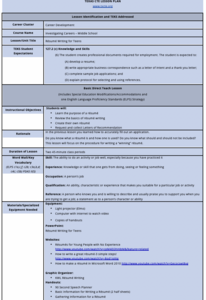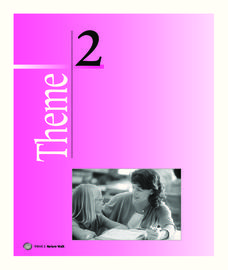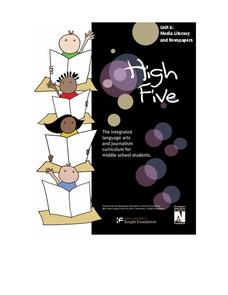Great Schools
Different Types of Writing
What type of writing is this? Learners read a brief introduction to various types of text: instructions, explanations, poems, folk tales, novels, informative, and arguments. The introduction doesn't explain these, so consider going over...
McGraw Hill
Phonics Teachers Resource Book
Looking to improve your classes literacy program? Then look no further. This comprehensive collection of resources includes worksheets and activities covering everything from r-controlled vowels and consonant digraphs, to the different...
K12 Reader
Narrative or Expository?
Narrative or expository? That is the question readers face on a two-part comprehension worksheet that asks kids to read a short passage about these two different types of writing, and then to answer a series of comprehension questions...
Poetry4kids
How to Write a Diamante Poem
A lesson begins with a description of a diamante poem and the rules to follow while writing one. Scholars examine the ins and outs of synonym and antonym diamantes, then compose an original poem using their newfound knowledge.
Teach It Primary
What Letter Will You Write?
After reading "The Pied Piper of Hamelin," scholars discuss the emotions the events provoked in its characters. In pairs, writers compose a letter depending on the topic and style of their choice then reply to their own or a peer's...
Curated OER
Identifying Different Kinds of Sentences - The Peacock's Feathers
Identify sentence types within a short paragraph and complete a sentence transformation worksheet. Learners review sentence types and study a sentence identification chart. They watch a video about peacocks and identify sentence examples...
Curated OER
Writing Applications: Different Types of Writing and Their Characteristics
Twelfth graders rewrite a story in a different format to understand the effects of the author's style. In this writing style lesson, 12th graders read Mark Twain's "The Celebrated Jumping Frog of Calaveras County" and rewrite the...
Houghton Mifflin Harcourt
Elaboration, Revision, and Proofreading
Designed to help writers strengthen their elaboration, revision, and proofreading skills, this 48-page workbook is packed with information about and exercises in personal, narrative, persuasive, and report writing.
Chymist
Writing Chemical Equations
Communicate chemistry clearly with a concise guide to writing chemical equations. It covers everything from the parts of a chemical equation to the different types of reactions that budding chemists may encounter.
National Center for Families Learning
The Summer Fun Summer Learning Poetry Unit
Focus on poetry this summer to enhance those comprehension, fluency, and language skills with a set of resources intended to explore different types of poetry, specifically lyric poetry. The daily activities contain differentiation ideas...
K5 Learning
Authors Tell Different Stories
The story of Cinderella is a popular one! So much so, there are multiple versions of the story being told around the world. With this collection of activities your young readers receive background information about two versions...
National Council of Teachers of English
Writing Acrostic Poems with Thematically Related Texts in the Content Areas
Scholars scour thematically aligned texts to gather a bank of words they can use in an original acrostic poem.
Curated OER
Simple, Compound, and Complex Sentences
Guide young grammarians through common sentence structures with a helpful slideshow presentation. Focusing on coordinating and subordinating conjunctions, the presentation helps individuals to see the elements that make up different...
Kinder Corner
Tracing Lines
Grab a pencil, get it sharpened, and start tracing! Pupils practice their tracing skills with a worksheet that offers five different types of lines.
Curated OER
Writing a Letter to a Friend
First graders practice their letter writing skills by writing to a fictional character. In this formal writing lesson, 1st graders read the books The Jolly Postman and Frog and Toad are Friends to examine the different parts of a...
Trinity University
Who Am I? Using Personal Narrative to Reflect on Identity
Who am I? Pupils work to answer this question through a unit that explores personal narratives and identity. Exit tickets for activities that examine different poems, short stories, and autobiographical writing serve as prewriting for...
Texas Education Agency (TEA)
Résumé Writing for Teens
Writing a resume is as easy as 1-2-3. Teens learn the basics of resume writing by viewing a PowerPoint and completing a KWL chart. Next, they type and submit their resumes.
Houghton Mifflin Harcourt
Nature Walk: English Language Development Lessons (Theme 2)
Walking in nature is the theme of a unit designed to support English language development lessons. Scholars look, write, speak, and move to explore topics such as camping, woodland animals, instruments, bodies of water, things found at a...
Anchorage School District
Hints for Writing a Conclusion
Writing the conclusion of an essay can often seem like a superfluous or daunting task. Support your young writers in understanding the various types and purposes of a conclusion paragraph, such as summarizing key points of a paper or...
K12 Reader
Inference Practice: Who Am I?
Have a little fun teaching your class about inferences with this short and simple guess who exercise. Provided with five short passages describing different types of people, young learners must read each one and use the included details...
Houghton Mifflin Harcourt
Nature Walk: Extra Support Lessons (Theme 2)
Reinforce concepts such as long vowels, spelling patterns, sound clusters, double-final consonants, and syllables with a nature-themed unit. Through a series of extra support lessons, learners compare and contrast using a Venn diagram,...
American Press Institute
High Five: Media Literacy and Newspapers
Teach the five different types of media with the first of three in a media literacy unit. Learners create and propose a final newspaper project, which must address information covered throughout the unit.
abcteach
Flowers for Algernon, by Daniel Keyes
Looking for materials to accompany your study of Flowers for Algernon, by Daniel Keyes? Look no further! Included here is everything you need to go alongside your unit: worksheets, graphic organizers, writing assignments, an assessment,...
Georgetown University
Tips and Techniques for Taking Notes in Class
From reading the class syllabi or listening for lecture indicators to considering typing vs. handwriting and formatting, read through this list of suggested note-taking tips that can help learners discover which techniques work best for...



